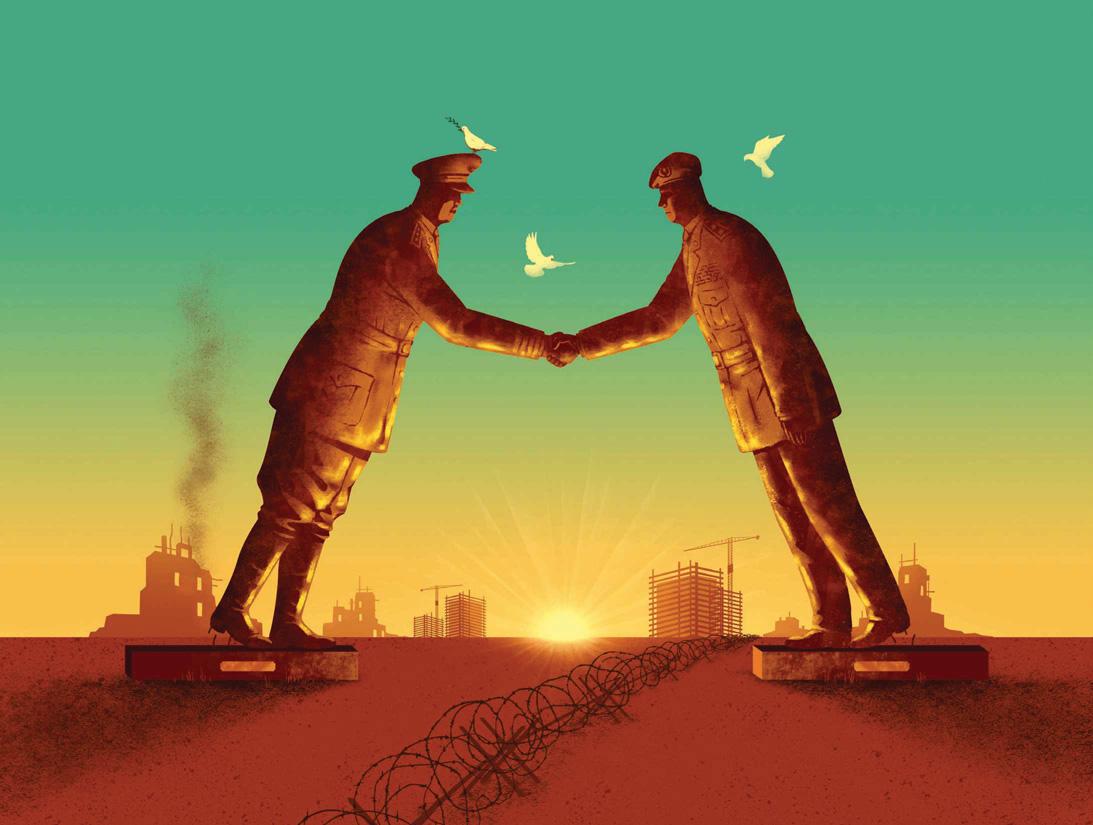
Rana Mitter Firstly, we would all hope for a resolution of these conflicts, in the Middle East and elsewhere. What history allows us to do is to look at the longer perspective and understand that sometimes conflicts that have gone on for years or even decades can eventually be resolved, and that sometimes it’s external factors and sometimes it’s internal factors that enable that to happen.
As a historian of modern China, I can offer two examples that provide a contrast. One is the relationship between India and China ever since the former gained independence in 1947 and the latter saw the establishment of Mao’s regime in 1949. Growing tensions between the two came to a head in 1962 with a small but very vicious war, and there have been border disputes ever since. This territorial dispute between the two Asian giants has never actually been resolved because of an issue of geography: there is an area of the Himalayas which is essentially most of the Indian state of Arunachal Pradesh, but which China argues should be Chinese territory. The two sides have never managed to resolve that dispute.
That’s in contrast with another example in which a seemingly endless conflict did come to an end: China’s war with Vietnam. In February 1979, China and Vietnam went into a short but very bloody war in which tens of thousands were killed on both sides. Across the following decade there were continuing border battles. Eventually, in 1990, a secret conference held in the Chinese city of Chengdu brought a resolution and in 1991, China and Vietnam signed a lasting border agreement. It’s an example of the way in which a resolution can sometimes be found to seemingly intractable conflict.
Hannah Skoda
This story is from the Christmas 2023 edition of BBC History UK.
Start your 7-day Magzter GOLD free trial to access thousands of curated premium stories, and 9,000+ magazines and newspapers.
Already a subscriber ? Sign In
This story is from the Christmas 2023 edition of BBC History UK.
Start your 7-day Magzter GOLD free trial to access thousands of curated premium stories, and 9,000+ magazines and newspapers.
Already a subscriber? Sign In
A modern icon
IVWWAN MORGAN lauds an insightful and clear-eyed examination of a leader blessed with charisma and quality but also marred by personal flaws

Shipwrecks on Scilly
Beneath the clear waters of the Isles of Scilly lurk treacherous rocks on which more than 1,000 ships have foundered. CLARE HARGREAVES discovers their stories

Medieval sambocade
ELEANOR BARNETT recreates an early cheesecake - a dish with surprisingly long roots stretching back well over two millennia

Greek drama
LLOYD LLEWELLYN-JONES is swept along by an engaging exploration of the Ptolemaic rulers of Egypt in the final centuries before Rome conquered this ancient land

Unravelling the enigma
JOSEPH ELLIS is impressed by a detailed, colourful and insightful biography of George Villiers, a Stuart royal favourite who made powerful enemies

The Elusive Pimpernel
Some suffragettes marched with banners, or printed and distributed propaganda pamphlets. Others took more direct action. DIANE ATKINSON tells the story of one activist who employed arson to spark awareness of the burning issue of women’s suffrage

A HILL TO DIE ON
In early 1944, the Allied advance in Italy was brought to a halt at a rocky outcrop called Monte Cassino. And at the heart of the bloodbath that followed, writes James Holland, was flawed leadership

How to build a radical
How to build a radical 6 8 The experiences that shaped Guy Fawkes and his gunpowder plot co-conspirators into violent extremists seem all too familiar today. Lucy Worsley tells a story of religious clashes, state-sanctioned torture and comrades-in-arms willing to die for the cause

WHO WAS GREATEST THE US PRESIDENT?
With Donald Trump set to be inaugurated as the 47th president, we asked seven historians to nominate their choice for the most accomplished American leader

Land of make believe?
Marco Polo's adventures in Asia earned him everlasting fame. But are his accounts of his travels essentially works of fiction? Peter Jackson asks if we can trust this medieval travel-writing superstar